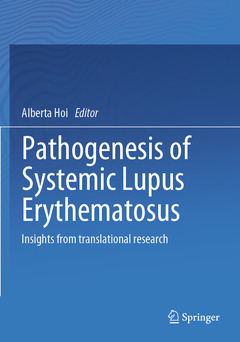Pathogenesis of Systemic Lupus Erythematosus, 1st ed. 2021 Insights from Translational Research
Coordonnateur : Hoi Alberta

This book will critically appraise the current understanding of important immunological pathways that contribute to the pathogenesis of lupus. We will review the role of interferons as part of the innate immune defects that perpetuate the loss of self-tolerance in SLE. B cell hyperactivity, as a defining hallmark of SLE, and different strategies of B cell targeted therapy will be discussed. The role of co-stimulation or immune checkpoint molecules in activating B and T cells will be reviewed, as well as other cytokines that serve in the amplification loop promoting a more proinflammatory Th1 or Th17 responses. Intracellular targets, such as signaling molecules in the JAK/STAT pathway, or a variety of kinases and proteasomes, can cause a cascading downstream effect of transcriptional responses that are important in SLE.
Immune homeostasis can also be restored by bolstering the naturally occurring anti-inflammatory mechanisms. Glucocorticoid, as a potent natural anti-inflammatory hormone, can mediate its effects by recruiting histone deacetylase that serve to repress gene transcription. Glucocorticoid-induced leucine zipper is a gene upregulated by glucocorticoid that can be a potential target for development of anti-inflammatory strategy. Finally, T regulatory cells can be utilized to help restore to immune tolerance and are amongst the latest focus of therapeutic development in SLE.
Overview of the translational research relevant to understanding the disease
Easy to read chapters for students, researchers and post-docs written by experts in the field
Comprehensive coverage from animal models, proof-of-concept, to results from human studies
Date de parution : 11-2022
Ouvrage de 178 p.
17.8x25.4 cm
Disponible chez l'éditeur (délai d'approvisionnement : 15 jours).
Prix indicatif 116,04 €
Ajouter au panierDate de parution : 11-2021
Ouvrage de 178 p.
17.8x25.4 cm
Disponible chez l'éditeur (délai d'approvisionnement : 15 jours).
Prix indicatif 158,24 €
Ajouter au panier


